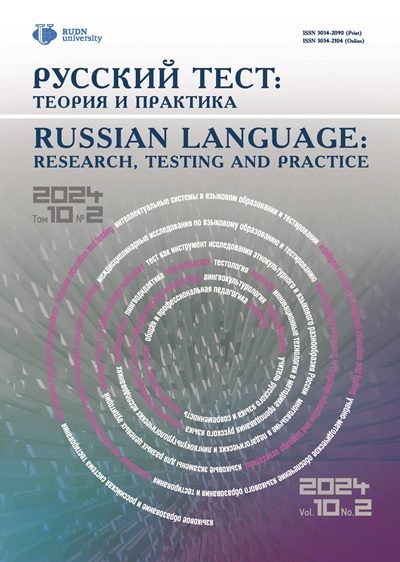The concept of “good” in the Russian and Uzbek language worldview
- Authors: Azizova N.B.1
-
Affiliations:
- Karshi State University
- Issue: Vol 10, No 2 (2024)
- Pages: 88-96
- Section: Linguistic View of the World in Education
- URL: https://journals.rudn.ru/russian-test/article/view/41098
- DOI: https://doi.org/10.22363/3034-2090-2024-10-2-88-96
- EDN: https://elibrary.ru/LCCSKG
Cite item
Full Text
Abstract
In modern linguistic science, the problem of interpreting phraseological units in the linguacultural aspect, revealing national-cultural components for the transmission of linguistic and cultural pictures of the world is relevant. The study considers the concept of “good” in the Russian and Uzbek languages. In order to reveal the concept of “good” in the Russian and Uzbek linguistic pictures of the world, phraseological units of the two languages are analyzed in the linguacultural aspect, i.e. lexical, etymological analysis of dictionary entries, comparative analysis of phraseological units are carried out, examples from fiction in Russian and Uzbek are given. As a result of the analysis of phraseological units, the author forms thematic groups of the concept of “good”.
Keywords
About the authors
Nasiba B. Azizova
Karshi State University
Author for correspondence.
Email: azizovanasiba@mail.ru
ORCID iD: 0000-0001-8579-197X
Ph.D., Associate Professor, Dean of the Faculty of International Educational Programs
Karshi, Republic of UzbekistanReferences
- Azizova, N.B. (2019). On the issue of bilingualism in the conditions of independence of Uzbekistan. Open Journal of Applied Sciences, 9(12), 870–875. https://doi.org/10.4236/ojapps.2019.912070
- Dolgopolova, M.V. (2015). The concept of “good” in the phraseological picture of the world. Young Scientist, (8), 1118–1120. (In Russ.).
- Huseynov, A.A., & Apresyan, R.G. (2000). Ethics. Moscow: Gardariki Publ. (In Russ.).
- Kholmanova, M., & Azizova, N. (2023). Parеmiological units (proverbs and sayings) as a source of linguistic and cultural information. International Bulletin of Engineering and Technology, 3(3), 42–45. https://doi.org/10.5281/zenodo.7701948
- Madmarova, G.A., & Rozykova, M.B. (2023). Results of the associative experiment of native speakers of Russian, Kyrgyz and Uzbek languages on the stimulus words “good” and “evil”. International Journal of Humanities and Natural Sciences, (4–3), 166–172. (In Russ.). https://doi.org/10.24412/2500-1000-2023-4-3-166-172
- Rakhmatov, A.R., & Abdullaeva, R.Kh. (2024). Representation of human virtue and vices in Russian and Uzbek linguocultures. Flagman Nauki, 2(13). (In Russ.). Stepanov, Yu.S. (2001). Constants: Dictionary of Russian culture. Moscow: Akademicheskii proekt Publ. (In Russ.).
- Trubetskoy, N.S. (1995). History. Culture. Language. Moscow: Progress Publ. (In Russ.).









